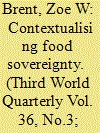| Srl | Item |
| 1 |
ID:
138464


|
|
|
|
|
| Summary/Abstract |
As food sovereignty spreads to new realms that dramatically diverge
from the agrarian context in which it was originally conceived, this
raises new challenges, as well as opportunities, for already complex
transnational agrarian movements. In the face of such challenges calls
for convergence have increasingly been put forward as a strategy for
building political power. Looking at the US case, we argue that historically
rooted resistance efforts for agrarian justice, food justice and
immigrant labour justice across the food system are not only drawing
inspiration from food sovereignty, but helping to shape what food
sovereignty means in the USA. By digging into the histories of these
resistance efforts, we can better understand the divides that exist as
well as the potential for and politics of convergence. The US case
thus offers important insights, especially into the roles of race and
immigration in the politics of convergence that might strengthen the
global movement for food sovereignty as it expands to new contexts
and seeks to engage with new constituencies.
|
|
|
|
|
|
|
|
|
|
|
|
|
|
|
|
| 2 |
ID:
162623


|
|
|
|
|
| Summary/Abstract |
The current configuration of global land politics – who gets what land, how, how much, why and with what implications in urban and rural spaces in the Global South and North – brings disparate social groups, governments and social movements with different sectoral and class interests into the issue of natural resource politics. Governance instruments must be able to capture the ‘political moment’ marked by the increasing intersection of issues and state and social forces that mobilise around these. This paper looks at whether and how the Voluntary Guidelines on Responsible Governance of Tenure of Land, Fisheries and Forests in the Context of National Food Security (also known as the TGs) passed in 2012 in the United Nations Committee for Food Security (CFS) can contribute to democratising resource politics today. This work puts forward some initial ideas about how systematic research into the TGs can be done more meaningfully.
|
|
|
|
|
|
|
|
|
|
|
|
|
|
|
|